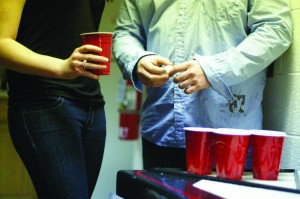Music
“Raise Your Glass”—Pink
The best word to describe Pink’s new album is “quirky.” At one point in the explicit version, she starts singing too early and interrupts a drum break and drops the f-bomb in a whisper. That sort of “I don’t care what you think of my music” attitude that is so typical of Pink is present throughout the song. Her lyrics profess she is loud, an underdog and “wrong in all the right ways.”
During the chorus “Raise Your Glass” she proposes a toast to her weirdness (hence the name). It’s got a really strong drumline in the chorus that’s not too overpowering, which makes the whole song very fun without having that Justin Bieber-y pop sound that kids like. The lyrics are a little out there, but that’s pretty typical.
Taylor Swift’s Entire New Album—Speak Now
It’s almost absurd that this is possible. For the past few weeks, Taylor Swift has been sporadically releasing one song at a time from this album to build up hype, and each one of them has been insanely popular. The first day of the release of the album, Monday (Oct. 5), 10 of the top 20 most downloaded songs on iTunes were hers. It’s almost unbelievable. Of course they all sound similar stylistically, but most of them are pretty decent, and the huge number of people who already have the album is proof of her apparently never-ending success.
“We R Who We R”—Ke$ha
Just in time for her visit to campus, Ke$ha has debuted a new single. It’s got a lot more actual singing than her other songs, but there are also portions with her signature talk-singing that you really can’t describe in words. Despite this minimal change, she is as popular as ever. It’s got the same meaningless lyrics typical of her songs, though. “We’re dancing like we’re dumb, dumb, dumb, dumb, dumb, our bodies going numb, numb, numb, numb, numb” is the beginning of the chorus. It’s been successful in the past, though, so why change it? Hopefully we’ll hear this one when she comes to campus on Friday.
Friday, Oct. 29
2:30 p.m. Engineering 100 C&E Event, Davis Gymnasium
2:30 p.m. Law Network Event, Elaine Langone Center Arches Lounge
7:30 p.m. Alumni Awards Presentation, Trout Auditorium (Vaughan Literature 100)
8 p.m. Shepardfest II, Theatre Performance, Tickets $8, Tustin Theatre
8:30 p.m. Alumni Awards Gala, Upstairs Elaine Langone Center
10 p.m. Late Night Alum. Austin Ziltz, 7th Street Café
Saturday, Oct. 30
8:30 a.m. Senior Legacy Reception, Elaine Langone Center Walls Lounge
11 a.m. Academic Village, Academic Quad
12 p.m. Field Hockey vs. Colgate, Graham Field at Holmes Stadium
1 p.m. Football vs. Lafayette, Christy Mathewson-Memorial Stadium
4 p.m. Women’s Soccer vs. Colgate, Emmitt Field at Holmes Stadium
8 p.m. ‘Fraulein Maria’, Doug Elkins & Friends (A Deconstruction of the Sound of Music), Weis Center
8 p.m. Shepardfest II, Theatre Performance, Tustin Theatre
9 p.m. Krimson and Kream Ball, Larison Dining Hall
9:30 p.m. Halloween Costume Party co-sponsored by DoRAK, Uptown
10 p.m. $1 Movie “Dinner for Shmucks,” Rooke Chemistry 116
Sunday, Oct. 31
5 p.m. Trick-or-Treat for Change, Smith Hall Third Floor Lounge
6 p.m. Halloween costume contest, Vedder Pit
8 p.m. Sophomore Recital: Mislav Forrester, trumpet, and Kayla Rossi, clarinet, Weis Music Building, Natalie Davis Rooke Recital Hall
8 p.m. Shepardfest II, Theatre Performance, Tustin Theatre
Monday, Nov. 1
7 p.m. Social Justice Speaker, Paul Loeb, Trout Auditorium
7:30 p.m. All of Us Supporting Americans Awareness Talk, Elaine Langone Center Gallery Theatre
8 p.m. Shepardfest II, Theatre Performance, Tustin Theatre
Tuesday, Nov. 2
12 p.m. Senior Excuses Lecture, McDonnell 242
4 p.m. PIAA Field Hockey Playoffs (High School), Graham Field at Holmes Stadium
5 p.m. Capitol Hill Internship Program Info Session, Elaine Langone Center 217
6 p.m. Goldman Sachs Info Session, Elaine Langone Center 272
7 p.m. Bucknell in London Info Session, Elaine Langone Center Walls Lounge
7 p.m. Mary Ruefle Poetry Reading, Bucknell Hall
7 p.m. Wresting Bison Blue/Orange Match, Davis Gym
7:30 p.m. Bucknell Forum, Neri Oxman, Trout Auditorium
Wednesday, Nov. 3
11:45 a.m. Women’s Sports Luncheon, Elaine Langone Center, Center Room
6 p.m. Conti Information Session, Taylor 115
7 p.m. Tony Ong, Taipei Economic and Cultural Office in NY, Elaine Langone Center Forum
8:30 p.m. Jazz at Bucknell, Bucknell Hall
10 p.m. $1 Movie “Twilight: Eclipse,” Elaine Langone Center Forum
10 p.m. Wacky Wednesday, Vedder Hall Living Room
Thursday, Nov. 4
4 p.m. Open Forum—Merit Aid, Trout Auditorium
7 p.m. Understanding Healthcare for Students, Rooke Chemistry 116
